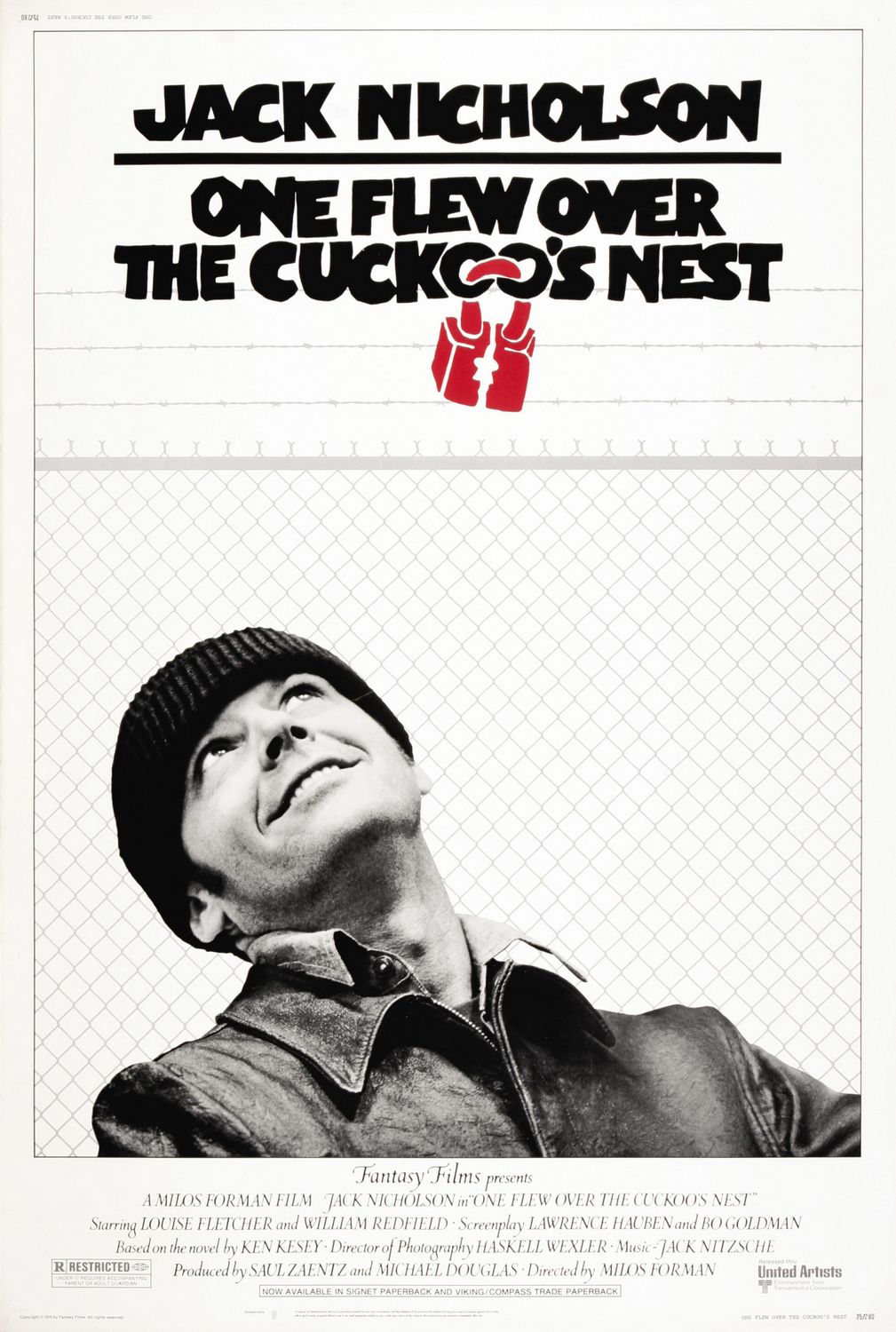It must have been back when we still had cable.
How I had never seen it before (and never read the original novel!) still eludes me, but a few years ago I was watching "One Flew Over the Cuckoo's Nest" for the first time. Like so many, I was riveted by it. I actually knew nothing about the storyline prior to seeing the movie, but after that I was fascinated by the metaphor of "The Combine".
It was serendipity, really, that made me watch that movie when I did. It was only a few days later than my Amazon book order arrived, which included the John Taylor Gatto book Dumbing Us Down: The Hidden Curriculum of Compulsory Schooling. In the forward of the book, written by David Albert, it makes reference to "The Combine" starting on page xv.
In actuality, writes Albert, John Taylor Gatto wrote the Monarch Notes for the novel "One Flew Over the Cuckoo's Nest" (Monarch Notes, from what I gather, are similar to what I knew as Coles Notes growing up), and it's "the only book of Gatto's likely read by students undergoing their slow death in what passes for 'educational institutions' these days". The notes, explains Albert, are a masterpiece in themselves.
There is also an irony that Gatto's message to us after spending 25 years in the school system and winning "Teacher of the Year" not once, but twice, is essentially about the dangers of the The Combine that is the modern school system.
Albert talks about how so much discussion about modern schools focuses on how schools are failing. I know that certainly is the case where I live, where we score in the bottom of the heap on standardized tests nationally. But, argues Albert, as we see from Gatto's work the system is in fact NOT failing us:
Central to this understanding is the fact that schools are not failing. On the contrary, they are spectacularly successful at doing precisely what they are intended to do, and what they have intended to do since their inception. The system [...] was explicitly set up to ensure a docile, malleable workforce to meet the growing, changing demands of corporate capitalism [...] The Combine ensures a workforce that will not rebel, that will be physically, intellectually, and emotionally dependent on corporate institutions for their incomes, self-esteem and stimulation, and that will learn to find social meaning in their lives solely in the production and consumption of material goods.I found these statements, while radical and controversial, to be eye-opening. They rang true to me. We are a society of consumers, a reality that can noted by even the most casual observers of modern Western society, and no one is immune. We are socialized like that.
 |
| From the United Church Archives |
I knew I wanted different for my children.
That was at the beginning of my homeschooling journey. I have tempered my views a bit over the years - take your tinfoil hat off, Carolyn! - but the fact remains that when people ask, "What about Socialization?", my answer is, "Excellent question!". What about socialization? Do you know what that means and the impact it's having on you, me and our children?
People intuitively know the power of the conditioning and programming that occurs in school - it's the first thing the overwhelming majority question regarding NOT sending your children to school - yet it's not a conscious thought for most. It's therefore difficult to conceptualize "education" to be any other way, even when "education" in the sense we commonly use the word is a secondary consideration in the way the system is designed. I struggle with this conceptualization constantly. I am absolutely choosing a different socialization for my children. I do not wish for them to be eaten by The Combine.
But it's not that simple, is it? I mean, The Combine is not just school. It's television, social media, even children's books. My experience has been that twaddle almost always has a not-so-subtle message that ties to that Combine socialization process.
(I think that's a topic I will circle back to another day - I wrote the preceding paragraph without really thinking about it, which created an "ah ha!" moment. An idea that I've never had before, and something that merits discussion after I've had time to flesh it out better.)
Okay, back on track...
What brought all this talk of The Combine up anyway? Actually, it was a job interview.
 |
| How much am I getting paid for this photo shoot anyway? |
Yay me! Not bad for a chick who hasn't had a paid gig in over eight years.
But something funny happened in the job interview. As we're talking, and I'm finding out more about the job and the client groups and the processes, the more I realize I don't want anything to do with it. I mean, the job would be enormously difficult for me to do anyway with the sheer logistics of child care, office space and personal availability, but there was something deeper that was making a sense of panic rise up inside me at the thought of going back to doing that sort of work.
I suddenly realized that I felt like I was trying to scramble back on board The Combine.
That was such a disorientated feeling. I worked for the federal government from 1999 until 2006 when Abby was born, and went back to work briefly in 2007 before deciding to stay home full-time. I actually quite liked my job back then, even if there were aspects of it I strongly disliked or disagreed with. Discussing in the interview certain theoretical and actual scenarios, and linking those situations back to my previous job, I began to understand the role I played in the entire Combine structure.
A job with Census would mean much of the same. I would be required to compel people to fit in pigeonholes, under threat of prosecution if they don't. I understand, and agree with, the need for good Census data, or with the need for people to comply with the Income Tax Act to ensure fairness to all.
Damn it, I agree with good laws and good governance. Why am I having such an issue with this?
It was reflecting on that question that forced me to ask myself why I believed in good laws and good governance. Certainly, I've been through The Combine and have been conditioned that we should obey the Government and all laws set out by them. That led me to the uncomfortable conclusion that I follow all laws set out by the government even when I vehemently disagree with some of them. Why did I do that? Why do I do that even when I acknowledge that some of these laws (or in the case of abortion, lack of laws) endangers others?
Well, there I had to stop thinking for a bit. It was disquieting to spend too much time meditating on that.
 |
| Hmmmm..... |
Disquieting things, however, have a way of oozing back into your consciousness whether you want them to or not.
I was, in the end, forced to ask myself if I was being hypocritical. I embrace Catholicism after all, and I choose to pass that belief system to my children. Some people argue, validly I might add, that religion is in itself a system of social control.
Now, I say that this argument is valid, because from a historical perspective it is. Using Christian Europe as an example, for many generations the Church did provide a social control mechanism by sharing common beliefs, mores, attitudes, culture and laws. These things were done largely for the benefit of our salvation (although there certainly were horrendous exceptions) and the stability of society. The shared culture and beliefs within a society has historically created strong, cohesive groups, such as what existed in the Middle Ages.
But move forward to the Reformation, and that cohesiveness starts to come unglued. Europe is no longer united under the banner of Catholicism, but starts to fragment. This paves the way for the Enlightenment, which begins the large-scale abandonment of belief in general.
Or does it?
The more I pondered this, the more I can't help think that because of the human need for belief and ethnocentricity is literally hardwired into us (see a summary of this experiment where it can actually be turned off by disrupting electrical activity in the brain), we simply replaced one system for another. As humanity has become increasingly mobile and groups mingle more and more, cohesiveness is further lost as thousands of groups interact, each with their own beliefs (or lack of belief), traditions, and customs.
We no longer have Christianity as a control mechanism in our Western society, so we replaced it with The Combine. Except instead of a system that has our interests at heart (which, in theory, Catholicism does...), we have a system that has fundamentally capitalist interests as it's foundational premise.
Now, I'm not saying immigrants are bad (they're not), or that everyone should be Catholic (okay, I do think that, but I know that's not realistic), or whatever other weird ideas you've gotten about me at this point (some of which may or may not be true, we'll sort that out later... ha ha ha!), but I'm proffering the above simply as an explanation. The Combine is something I routinely struggle with, as it seems obvious by this post. I have guilt oftentimes too because I do choose to send Abby to school, but precisely because of the social control mechanism it provides.
So back to Gatto. In his essay/speech "The Psychopathic School", which he presented when he won New York City Teacher of the Year, he gives a description of the grind his students are subjected to in terms of influence from the two primary activities children do: go to school, and watch TV:
Here is the calculus of time the children I teach must deal with:That makes my heart ache. Our children have a scant nine hours a week alone with their thoughts. Of course, the above was written in 1990, before social media, smart phones, and the permeation of the Internet into our homes. The most recent statistics I could find stated that the average child spends 6.5 hours per day in front of screens. Teenaged boys spend the most at eight hours a day, and many children will use multiple screens simultaneously.
Out of 168 hours each week, my children sleep 56. That leaves them 112 hours a week out of which to fashion a self.
According to recent reports (1990), children watch 55 hours of television a week. That leaves them 57 hours a week in which to grow up.
My children attend school 30 hours a week, use about eight hours getting ready for and traveling to and from school, and spend an average of about seven hours a week on homework - a total of 45 hours. During that time they are under constant surveillance. They have no private time or private space and are disciplined if they try to assert individuality in the use of time or space. That leaves them 12 hours a week out of which to create a unique consciousness. Of course my kids eat too, and that takes some time - not much because we've lost the tradition of family dining - but if we allot three hours a week on evening meals we arrive at a net amount of private time of each child of nine hours per week. (Dumbing Us Down, pages 25-26)
What does that mean?
Sometimes, I think it means we're doomed.







